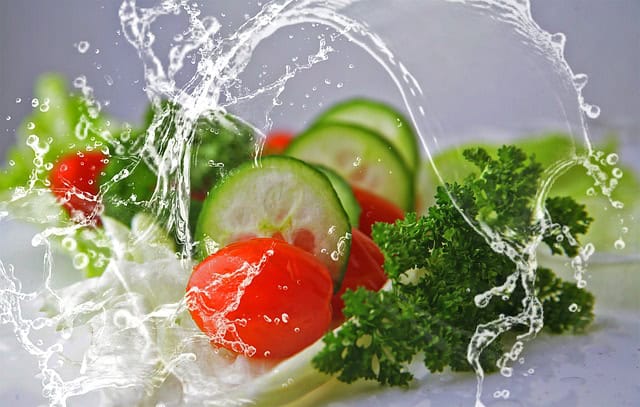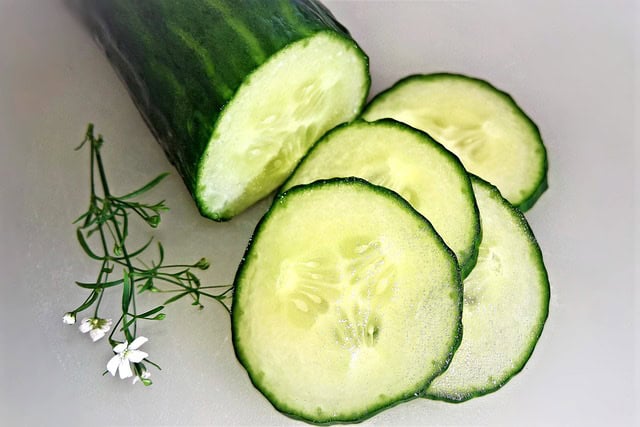Cucumbers, with their cool, crisp flesh and refreshing flavor, are a staple in summer salads and a delightful snack on their own. But beyond their undeniable deliciousness, cucumbers boast a surprising array of health benefits. This article delves into the fascinating world of cucumbers, exploring their rich nutrient profile, potential health advantages, and how they can contribute to a balanced diet.

A Nutritional Breakdown
Cucumbers are more than just water; they’re packed with essential vitamins, minerals, and antioxidants. Here’s a glimpse into their nutritional composition per 100 grams (g) serving [1]:
Calories: Only 16 kcal, making them a perfect choice for weight management.
Water: A whopping 96.7 g, contributing to hydration and promoting a feeling of fullness.
Carbohydrates: 3.1 g, including a small amount of fiber (0.5 g).
Vitamin K: 62% of the Recommended Daily Value (DV), crucial for blood clotting and bone health.
Vitamin C: 14% of the DV, an essential antioxidant that supports the immune system and collagen production.
Potassium: 5% of the DV, an electrolyte that helps regulate blood pressure and muscle function.
Manganese: 4% of the DV, an enzyme cofactor involved in metabolism, bone health, and wound healing.
Molybdenum: 4% of the DV, a trace mineral that supports enzyme function and purine metabolism.
While seemingly modest in quantity, these micronutrients contribute significantly to overall health when consumed as part of a balanced diet.
Cucumbers offer a range of potential health benefits, making them a valuable addition to your dietary routine. Let’s explore some of the key areas where they might play a role:
Unveiling the Health Benefits of Cucumbers
Hydration
As mentioned earlier, cucumbers are over 95% water. This makes them a fantastic way to stay hydrated, especially during hot weather or physical activity. Proper hydration is crucial for various bodily functions, including digestion, nutrient absorption, and temperature regulation.

Weight Management:
The low-calorie, high-water content of cucumbers makes them ideal for weight management. They can help you feel full for longer, potentially reducing calorie intake and aiding weight loss efforts.
Digestive Health:
Cucumbers contain a small amount of fiber, which promotes healthy digestion and regularity. They may also help soothe digestive issues like heartburn and inflammation.
Blood Pressure Regulation:
Potassium, a mineral found in cucumbers, helps regulate blood pressure by counteracting the effects of sodium. This can be beneficial for individuals with hypertension or at risk of developing it.
Skin Health:
Cucumbers’ high water content and cooling properties might contribute to healthy skin. Additionally, vitamin C, present in cucumbers, plays a role in collagen production, which is essential for maintaining skin elasticity and reducing wrinkles. For proof of these advantages, more study is necessary. , Antioxidant Potential: Cucumbers contain certain antioxidant compounds, such as cucurbitacins and flavonoids, which may help protect cells from damage caused by free radicals. This, in turn, could potentially reduce the risk of chronic diseases like cancer and heart disease.
It’s important to note that most of the research on the health benefits of cucumbers is based on observational studies. While these studies suggest potential benefits, more robust clinical trials are needed to confirm these effects.
Cucumber Juice for Weight Loss: Separating Fact from Fiction
Cucumber juice has gained popularity as a weight-loss aid. Let’s examine the underlying science for this assertion
Low-Calorie Content: Like whole cucumbers, cucumber juice is low in calories. Replacing sugary drinks with cucumber juice can certainly help reduce overall calorie intake, potentially leading to weight loss.
Hydration Boost:
Just like whole cucumbers, cucumber juice can contribute to hydration, which can promote a feeling of fullness and potentially reduce calorie intake.
Limited Fiber:
While cucumbers contain some fiber, the juicing process removes most of it. Fiber is essential for promoting satiety and gut health. Without it, cucumber juice may not be as effective in curbing appetite compared to whole cucumbers.
While cucumber juice can be a refreshing and hydrating addition to your diet, it’s not a magic bullet for weight loss. A sustainable weight-loss approach should focus on a balanced diet that includes whole foods like fruits, vegetables, whole grains, and lean protein, combined with regular physical activity.
Here are some key considerations when incorporating cucumber juice into your weight-loss plan:
Limit portion sizes: Stick to a moderate amount of cucumber juice, ideally around 250 ml (8 oz) per serving.
Pair it with whole foods: Consume cucumber juice alongside
Conclusion
The humble cucumber offers a surprising array of health benefits. Packed with essential vitamins, minerals, and antioxidants, it contributes to hydration, promotes weight management, supports digestive health, and might even offer benefits for blood pressure regulation and skin health. While cucumber juice can be a refreshing addition to your diet, it’s not a magic solution for weight loss.
For lasting health and weight management success, focus on incorporating whole cucumbers into a balanced diet rich in fruits, vegetables, whole grains, and lean protein. Remember, a healthy lifestyle that includes regular physical activity alongside a balanced diet is key to achieving and maintaining your weight loss goals.
So, the next time you reach for a refreshing snack, consider the mighty cucumber. This readily available and versatile vegetable can be a delicious and nutritious addition to your dietary routine, supporting your overall well-being on multiple fronts.













